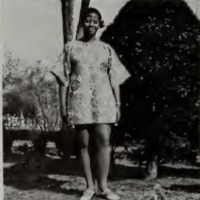Patricia Whitley-Williams '71
Dr. Patricia Whitley-Williams ‘71 was interviewed by Kaycee Jackson ‘24 in spring 2023.
Dr. Patricia Whitley-Williams discusses the Ten Demands the Black Student Organization presented to Simmons President William Park. Dr. Whitley-Williams emphasizes their demands for Black administration, faculty, and leadership.
Transcript
Interviewer: Kaycee Jackson (KJ)
Narrator: Patricia Whitley-Williams (PWW)
PWW: Remember, I mentioned that we boycotted the president’s office– I mean we took over the president’s office. That was under leadership of Paula Sneed, she was really such a leader and many other people were involved. And I can't remember exactly what year that was and I think we were– you know, trying to– we had a list of ten demands or whatever, you know. it was just– we wanted to see more African American faculty teaching at Simmons, you know, we wanted to see more students of color admitted at– to Simmons. We wanted to make sure there were African American studies included in the curriculum at Simmons. I can't remember what the other demands were, but those were– you know, those were some of the demands at that time.
KJ: I actually have a photograph of that as well!
PWW: [laughs] Uh oh. Oh my goodness! Oh my goodness.
KJ: Does this bring back any memories?
PWW: Oh my goodness. Yes, I told you there were ten demands, I was right! [Mumbling to self] Oh my goodness. Oh my goodness. Oh, thats fantastic, you have good–
KJ: Do you remember any of these? Do you remember any of these demands that really stuck out to you the most, that you were really passionate about?
PWW: I think the demand for more, you know, Black student advisors, you know, to hire a dean basically, you know, a Black student affairs dean or student dean. I remember that quite strongly. I think Helen Davis may – I think that was her name – I think she came after that and hopefully as a result of this. Also, the financial aid, cause you know, of course that was something that, you know, I was– had an impact on me. I would have loved to have stayed, you know, stayed at school, I did my last two years. But, you certainly– you know the financial policy, what else? That, I remember the recruitment of teachers, yeah see we demand– the last one says “We demand that a Black person or a group of black people be hired to recruit black people to fill the above positions”. And I think that includes student affairs, I didnt- I don't remember the Child Study Center, that was one of the demands. So, yeah, so I think the- the- the, I think the biggest– or the one that I remember most was certainly trying to recruit more black faculty and student advisors, for the students who were there, for the students of color who were already there at Simmons. Trying to increase the number of students of color at Simmons.
KJ: Why do you personally feel as though it’s really important to have Black faculty at Simmons?
PWW: I– First of all as role models, not only for students of color but for all students. Diversity is important, important to have at all levels, so faculty, staff, administration, leadership, student body, obviously. You know diversity is – and there are studies that show – that the more diverse a workforce, or the more diverse an intuition is, the better the outcomes. And Simmons had typically been predominantly, I guess, white female college, and it was time to bring diversity to the campus, everybody comes with a story. And someone needed to tell the African American story, someone needed to tell the African story, because that was part of our history. So how could you call yourself a liberal arts college and not include African American Studies? That was an important piece that often was left out. So, even though Simmons was progressive in some ways, because, you know, they were educating college women to go out and become part of the workforce, particularly in leadership positions and business and so forth.You know, It was just as important that it be diverse, so diversity is a good thing for any institution.Whether it’s an institution of Higher Education, or an institution you know, in primary or- or high school. Whether it's a private organization, or whether it's an organization like, you know, Amazon, it’s important to have diversity and [the institution] should reflect, right? The population in which that institution is based.
